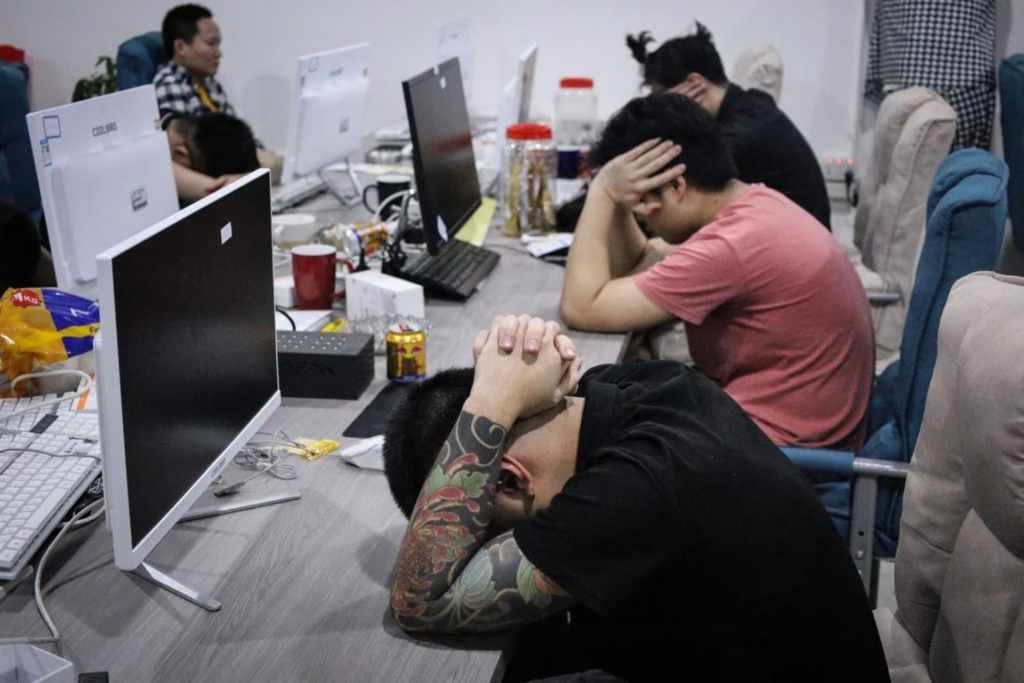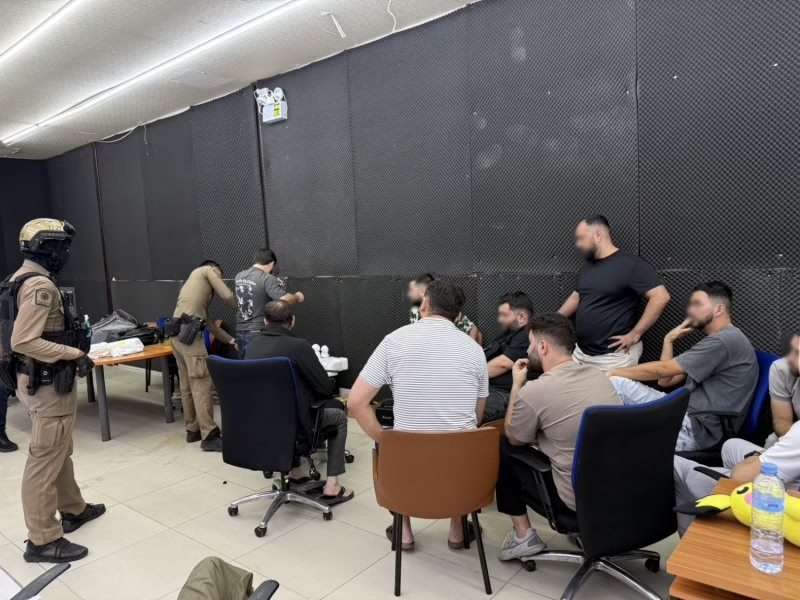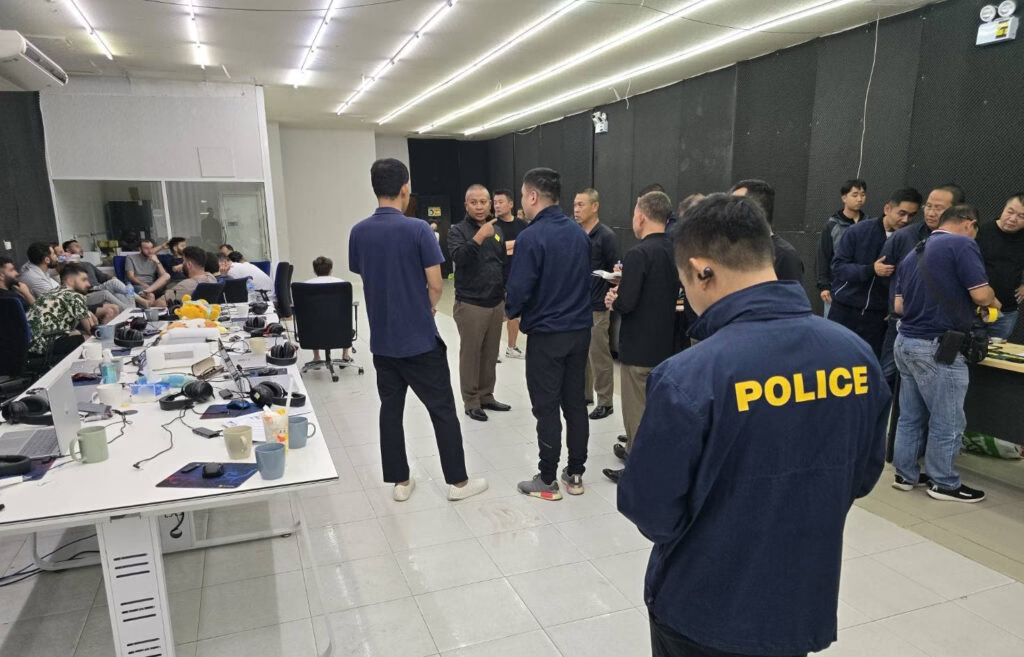BANGKOK – In a dramatic dawn raid that highlights Thailand’s ongoing struggle with cross-border cybercrime, police stormed a luxury apartment complex in an upmarket Bangkok neighbourhood and arrested fifteen foreign suspects accused of running a high-pressure crypto boiler room investment scam.
Officials say the operation was a classic “boiler room”, a hard-sell call centre set up to cheat victims around the world with a fake trading platform. The case shows how online finance has become a powerful tool for organised crime groups in Southeast Asia.
The suspects, believed to include Azerbaijani, Georgian, and Ukrainian nationals, were detained after officers from the Royal Thai Police (RTP), working with the Cyber Crime Investigation Bureau (CCIB), raided the property.
Inside, officers found a slick, office-style set-up rather than a makeshift hideout. There were cubicles, desks, headsets, and rows of computers running customised scam websites that displayed false investment returns. Investigators also seized detailed calling scripts used to pressure targets into investing.
According to police, the group focused on victims in English-speaking countries, especially wealthier retirees. The callers allegedly promised unrealistically high yields, sometimes up to 10% on fixed-income bonds or cryptocurrency products, and pushed victims to transfer large sums into what turned out to be fake investment schemes.

How a Modern Boiler Room Scam Works
The Bangkok operation offers a clear look at how many current boiler room scams are set up. Rather than operating from dark back rooms, many syndicates now rent high-end flats, villas, or secure office space so they appear professional and trustworthy.
The fraud often starts long before any phone call is made. The group first gets “sucker lists”, or lead data, often bought from other criminal groups. These lists contain people who have shown interest in investing or those who have already been tricked before.
Callers then use Voice over Internet Protocol (VoIP) systems and disposable phones to contact people around the world. They follow strict scripts, use fake names, and often pretend to be staff from well-known international banks or investment firms.
“They are experts in reading people and playing with their emotions,” said a police source close to the case. “They build confidence slowly, send forged documents, and direct victims to professional-looking websites.
The victims log in and see their ‘portfolio’ growing in real time, but the numbers on the screen are completely fake.”
Once a victim agrees to invest, the money is typically sent in cryptocurrency, often in stablecoins such as USDT. As soon as the funds arrive, they are shifted at high speed through unhosted wallets and moved across several different blockchains using cross-chain bridges and layered services.
This money trail often moves between networks such as Ethereum and TRON, then ends at lightly supervised payment services or exchanges.
The goal is simple: to break the link between the stolen funds and the original victim so that tracing and recovery become almost impossible, even for specialist investigators. Losses from similar scams across the region are believed to reach tens or even hundreds of millions of dollars.
Thailand’s Role as a Key, Yet Vulnerable, Hub
The latest raid shines a harsh light on Thailand’s difficult position in the fight against organised online fraud. Authorities, including the RTP and the Digital Economy and Society (DES) Ministry, have rolled out joint crackdowns and public awareness campaigns. Yet the country’s geography, porous borders, and ongoing corruption problems have helped turn it into a staging ground, and sometimes a base, for cybercrime networks.
Thailand borders several known scam hotspots, especially areas in Myanmar and Cambodia, where large, fortified compounds house thousands of workers who have been trafficked or lured with false job offers. Many are forced under threat to work long hours running romance scams, investment frauds, and fake loan platforms targeting victims around the world.
Even when the fraud hubs sit inside Thailand, as in this Bangkok case, gangs rely on the country’s solid internet infrastructure, banking links, and relatively easy visa options. Officials admit that online scams and criminal call centres have grown into a “global threat” and now rank as a priority for national security and economic policy.
Recent enforcement work has led to high-profile arrests and sizeable asset seizures. Yet the roots of the problem remain. Early this year, the arrest of a serving police officer accused of opening “mule accounts” for a scam ring exposed how corruption inside law enforcement can help these schemes survive and expand.
International cooperation has become a key tool in Thailand’s response. The RTP and CCIB have worked with agencies such as the Australian Federal Police (AFP) and Chinese authorities on cross-border investigations, extraditions, and joint operations. However, the sheer size of the problem is daunting. Experts estimate that people in Thailand alone have lost billions of baht to phone and online scams since 2022.
In many cases, major raids remove one group while leaving the wider network intact. The “empire of the scam” shakes, but does not fall.
Meanwhile, the fifteen detained foreigners now face charges including conspiracy to commit an offence and working in Thailand without permits. Police say more serious allegations are likely, such as large-scale fraud and involvement in transnational organised crime.
This case is a sharp reminder for both authorities and the public. Raids on scam hubs can disrupt operations and yield valuable evidence, but they do not fix the underlying conditions that let these businesses grow.
These conditions include:
- The technical complexity of tracing cryptocurrency flows
- A steady pool of vulnerable victims, especially older investors
- Weak oversight and corrupt contacts that provide safe havens along the border areas
Tackling these problems will require patience and long-term work. That means closer cooperation between countries, stronger financial monitoring, genuine action against corrupt officials, and more education for potential victims.
For now, the Bangkok raid marks a clear success, but also a warning. The fight to protect people from sophisticated online financial fraud in Southeast Asia is still at an early stage, and the boiler rooms are far from gone.















